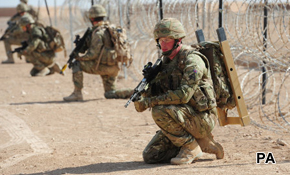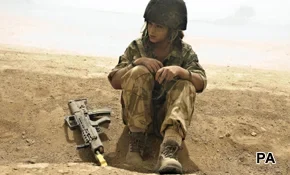We invited you to state your position on Britain’s continued involvement in Afghanistan – and whether, when and why the UK should exit
As one of NATO’s founding members, the UK’s involvement in Afghanistan began in 2001, and since then 414 British soldiers have lost their lives in the conflict.
Additionally, a recent estimate by the independent House of Commons Library said that so far the war has cost the British taxpayer £17.3 billion, and that the total would be at least £20 billion.
David Cameron has set December 2014 as the deadline for withdrawing British combat operations from Afghanistan.
YouGov’s Public Opinion polling in April of this year found that a strong majority of the British public (77%, split between leaving immediately and leaving gradually) were in favour of bringing British troops home from Afghanistan, while 14% were not in favour, and 9% said they didn’t know.
 When we invited participants into Labs to discuss British involvement in Afghanistan, those who took part were also strongly in favour of an exit.
When we invited participants into Labs to discuss British involvement in Afghanistan, those who took part were also strongly in favour of an exit.
Unlike respondents to the YouGov Public Opinion poll however, participants in the Labs discussion were more in favour of an immediate pull-out, rather than troops returning home gradually, when we asked them what course of action they supported.
Among those taking part who said the mission in Afghanistan should end either immediately or soon, the reason given most was that the mission was doomed to failure:
“British Troops are faced with an impossible situation where they do not know who the enemy are, the Taliban and their Afghan supporters are not brave enough to come out into the open and fight honourably but hide and kill our soldiers by means of hidden IED's. You will never get democracy in a country where law is run on tribal differences and based on corruption. If the Taliban cannot be stopped while the British and other armies are in the country, when will they ever be under control?” Avril, Swansea
Others argued that the Afghan people didn’t want foreign troops in the country and weren’t ready for Western-style democracy:
“There is no intention on the part of Afghanistan to introduce democracy or equal rights for women. Karzai is in favour of restricting women's liberty. Do we want to be a party to this?” Keith, London
Many participants simply reasoned that “we should never have been there in first place”, and described the mission as “pointless”. Some complained that political leaders never made a clear case for going to Afghanistan initially.

Participants often grouped the loss of lives together with the economic cost of the war, and believed neither were worthwhile sacrifices:
“Britain and the USA have no right to meddle in Middle Eastern affairs, and we should not be in these countries behaving like a colonial power, or trying to enforce democracy by military means on other cultures. Also, we cannot afford to spend billions of pounds on keeping UK armed forces in Iraq and Afghanistan when our own economy is in a disastrous state. All of this expenditure would be far better spent on the NHS, housing, education and job creation in the UK” Anon
A few of you who favoured a more gradual withdrawal gave "logistics” and the need to train Afghan security forces as reasons why, but on the whole the opinions of the “leave immediately” and “leave soon” groups did not differ greatly.
Of the small proportion of you who said British troops should stay in Afghanistan, the main reason was a belief that the UK should finish the job that it started, and that leaving now would mean the lives that were lost were in vain:
“Coming out too early will have wasted the lives of those sacrificed since the war began, and the country is very likely to deteriorate back to the failed state supporting terrorism that it was before” Anon






